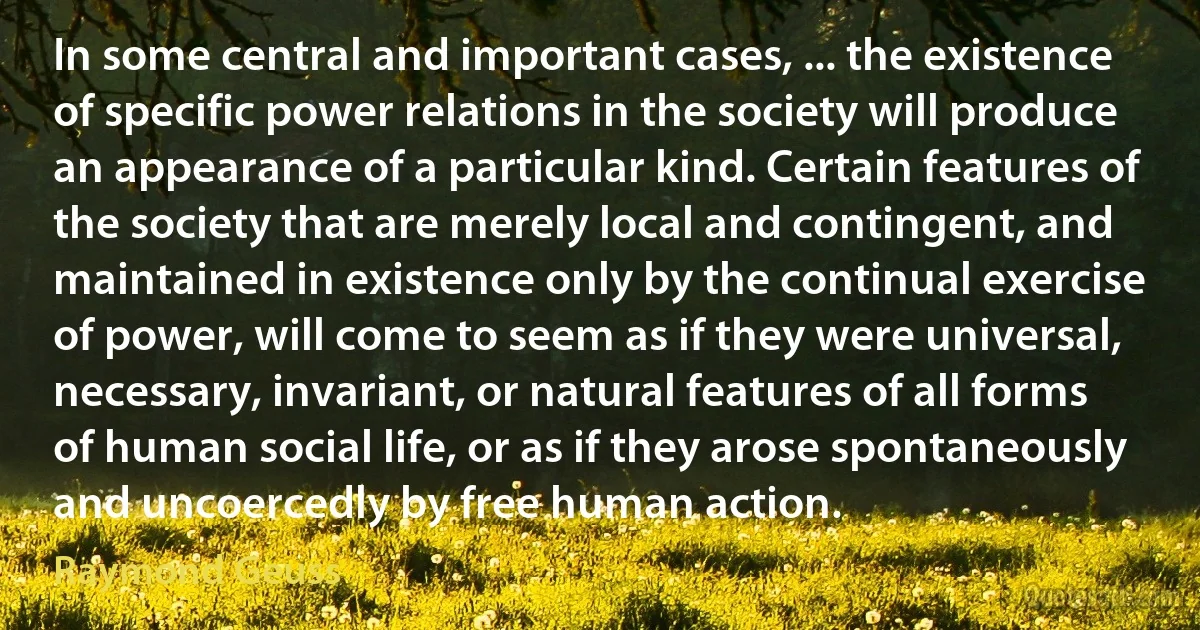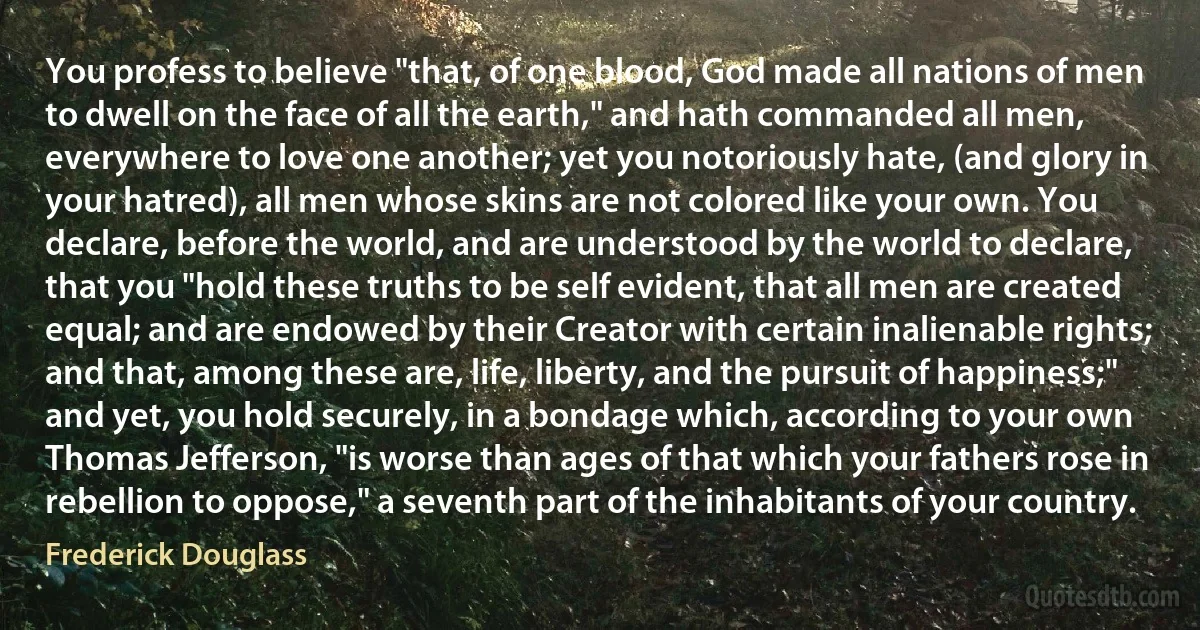Certain Quotes - page 81
To make peace in the world secure, the United Nations must have readily at its disposal, as a result of firm commitments undertaken by all of its members, military strength of sufficient dimensions to make it certain that it can meet aggressive military force with international military force, speedily and conclusively. If that kind of strength is made available to the United Nations [...] in my view that strength will never again be challenged in war and therefore need never be employed. But military strength will not be enough. The moral position of the United Nations must ever be strong and unassailable; it must stand steadfastly, always, for the right.

Ralph Bunche
According to the dictionary, to administer is to govern, or to manage a public or private business. It means, therefore, to seek to make the best possible use of the resources available in achieving the goal of the enterprise. Administration includes, therefore, all the operations of the enterprise. But as a result of the usual way of organizing things to facilitate the running of the business, a certain number of activities constitute the special departments; the technical department, the commercial department, the financial department, etc., and the scope of the administrative department is found to be reduced accordingly.

Henri Fayol
Gurnemanz is still not absolutely certain that Parsifal is pure and a fool, as he makes the decision to lead Parsifal to the castle of the Graal, for Gurnemanz sang after they both had walked a while: Now pay attention, and let me see, if you are a fool and if you are pure...! - The test, if he is a pure fool, shall come to Parsifal first in the Temple of the Graal! This point cannot be worked out further here.

Theodor Reuss
Commerce, Opulence, Luxury, Effeminacy, Cowardice, Slavery: these are the stages of national degradation. We are in the fourth; and, I beg the reader to consider, to look into history, to trace states in their fall, and then say how rapid is the latter part of the progress! Of the symptoms of effeminacy none is so certain as a change from athletic and hardy sports, or exercises, to those requiring less bodily strength, and exposing the persons engaged in them to less bodily suffering; and when this change takes place, be assured that national cowardice is at no great distance, the general admiration of deeds of hardihood having already been considerably lessened.

William Cobbett
Even a statement very close to the periphery can be held true in the face of recalcitrant experience by pleading hallucination or by amending certain statements of the kind called logical laws. Conversely, by the same token, no statement is immune to revision. Revision even of the logical law of the excluded middle has been proposed as a means of simplifying quantum mechanics; and what difference is there in principle between such a shift and the shift whereby Kepler superseded Ptolemy, or Einstein Newton, or Darwin Aristotle?

Willard van Orman Quine
[Relativist] Rel. There is a well-known proposition of Euclid which states that "Any two sides of a triangle are together greater than the third side." Can either of you tell me whether nowadays there is good reason to believe that this proposition is true?
[Pure Mathematician] Math. For my part, I am quite unable to say whether the proposition is true or not. I can deduce it by trustworthy reasoning from certain other propositions or axioms, which are supposed to be still more elementary. If these axioms are true, the proposition is true; if the axioms are not true, the proposition is not true universally. Whether the axioms are true or not I cannot say, and it is outside my province to consider.

Arthur Eddington
Each expression-medium has a life of its own. Regulated by certain laws, it can be mastered only by intuition during the act of creating. It is in the nature of the laws which govern every expression medium that two separate entities, related through empathy, always produce a higher third of a purely spiritual nature. This spiritual third manifests itself as a quality which carries emotional content. This quality is the opposite of illusion; it is the reality of the spirit.

Hans Hofmann
Monumentality is an affair of relativity. The truly monumental can only come about by means of the most exact and refined relation between parts. Since each thing carries both a meaning of its own and an associated meaning in relation to something else - its essential value is relative. We speak of the mood we experience when looking at a landscape. This mood results from the relation of certain things rather than from their separate actualities. This is because objects do not in themselves possess the total effect they give when interrelated.

Hans Hofmann
Speech has arisen through the need for expression. Certain factors have contributed to making it the paramount utilitarian method of expression. There are ideas and things expressible in words, but there are ideas better expressed in music, the person with no musical ear, or without discipline in the language of music, lacks the key to the door of the world of musical experience. But we live in a world of volume and space; it is hard to conceive of the person who is space-blind or volume-deaf. The great majority of people have the means of approach to plastic beauty as part of their natural equipment. The teacher can develop this natural endowment as Necessity, the greatest teacher, has developed speech.

Hans Hofmann
The reciprocal relation of color to color produces a phenomenon of a more mysterious order. This new phenomenon is psychological. A high sensitivity is necessary in order to expand color into the sphere of the surreal without losing creative ground. Color stimulates certain moods in us. It awakens joy or fear in accordance with its figuration. In fact, the whole world, as we experience it visually, comes to us through the mystic realm of color. Our entire being is nourished by it. This mystic quality of color should likewise find expression in a work of art.

Hans Hofmann
The health of the white people requires that the negro cabin be kept clean; and the maintenance of chastity there is necessary for the protection of woman throughout the land. The need of making the black man more intelligent and conscientious has already been so far recognized by the South, that she has remodelled her entire school system for his benefit; and her desire to make him more valuable as a member of the community, cannot long permit him to be lynched or otherwise maltreated. Her memory of the misrule of the carpet-baggers will grow fainter; and she will finally be able to see that even the illiterate voter is not so dangerous a citizen in a republic as the man who has not this reason to interest himself in its welfare. The South may be much slower than we could wish in reaching these conclusions; but no others will be found permanently satisfactory to her; and it is by no means certain that her pace will be quickened by a display of federal bayonets.

Frederick Douglass
Old as the everlasting hills; immovable as the throne of God; and certain as the purposes of eternal power, against all hinderances, and against all delays, and despite all the mutations of human instrumentalities, it is the faith of my soul, that this anti-slavery cause will triumph.

Frederick Douglass
It would be no vindication of the right of speech to prove that certain gentlemen of great distinction, eminent for their learning and ability, are allowed to freely express their opinions on all subjects - including the subject of slavery. Such a vindication would need, itself, to be vindicated. It would add insult to injury. Not even an old-fashioned abolition meeting could vindicate that right in Boston just now. There can be no right of speech where any man, however lifted up, or however humble, however young, or however old, is overawed by force, and compelled to suppress his honest sentiments.

Frederick Douglass
The formulation "ways to faith" could be interpreted as implying that faith is a conclusion a person may come to after pondering certain facts about the world-facts about history, nature, or consciousness. If that were the case, one could lead a person to this conclusion by presenting these facts to him and pointing out their implications. I, however, do not regard religious faith as a conclusion. It is rather an evaluative decision that one makes, and, like all evaluations, it does not result from any information one has acquired, but is a commitment to which one binds himself. In other words, faith is not a form of cognition; it is a conative element of consciousness.

Yeshayahu Leibowitz

![A non-mathematical presentation has necessary limitations; and the reader who wishes to learn how certain exact results follow from Einstein's, or even Newton's, law of gravitation is bound to seek the reasons in a mathematical treatise. ...[T]he geometry of relativity in its perfect harmony expresses a truth... which my bowdlerised version misses.
But the mind is not content to leave scientific Truth in a dry husk of mathematical symbols, and demands that it shall be alloyed with familiar images. (Arthur Eddington)](https://cdn.quotesdtb.com/img/quotes_images_webp/44/arthur-eddington-bound-certain-393644.webp)

